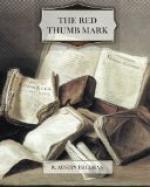“Are you going to take me into your confidence?” I asked.
“When we get home, if you are not too sleepy,” he replied.
On our arrival at his chambers, Thorndyke desired me to light up and clear one end of the table while he went up to the workshop to fetch some tools. I turned back the table cover, and, having adjusted the gas so as to light this part of the table, waited in some impatience for my colleague’s return. In a few minutes he re-entered bearing a small vice, a metal saw and a wide-mouthed bottle.
“What have you got in that bottle?” I asked, perceiving a metal object inside it.
“That is the projectile, which I have thought fit to rinse in distilled water, for reasons that will presently appear.”
He agitated the bottle gently for a minute or so, and then, with a pair of dissecting forceps, lifted out the object and held it above the surface of the water to drain, after which he laid it carefully on a piece of blotting-paper.
I stooped over the projectile and examined it with great curiosity, while Thorndyke stood by regarding me with almost equal interest.
“Well,” he said, after watching me in silence for some time, “what do you see?”
“I see a small brass cylinder,” I answered, “about two inches long and rather thicker than an ordinary lead pencil. One end is conical, and there is a small hole at the apex which seems to contain a steel point; the other end is flat, but has in the centre a small square projection such as might fit a watch-key. I notice also a small hole in the side of the cylinder close to the flat end. The thing looks like a miniature shell, and appears to be hollow.”
“It is hollow,” said Thorndyke. “You must have observed that, when I held it up to drain, the water trickled out through the hole at the pointed end.”
“Yes, I noticed that.”
“Now take it up and shake it.”
I did so and felt some heavy object rattle inside it.
“There is some loose body inside it,” I said, “which fits it pretty closely, as it moves only in the long diameter.”
“Quite so; your description is excellent. And now, what is the nature of this projectile?”
“I should say it is a miniature shell or explosive bullet.”
“Wrong!” said Thorndyke. “A very natural inference, but a wrong one.”
“Then what is the thing?” I demanded, my curiosity still further aroused.
“I will show you,” he replied. “It is something much more subtle than an explosive bullet—which would really be a rather crude appliance—admirably thought out and thoroughly well executed. We have to deal with a most ingenious and capable man.”
I was fain to laugh at his enthusiastic appreciation of the methods of his would-be assassin, and the humour of the situation then appeared to dawn on him, for he said, with an apologetic smile—
“I am not expressing approval, you must understand, but merely professional admiration. It is this class of criminal that creates the necessity for my services. He is my patron, so to speak; my ultimate employer. For the common crook can be dealt with quite efficiently by the common policeman!”




